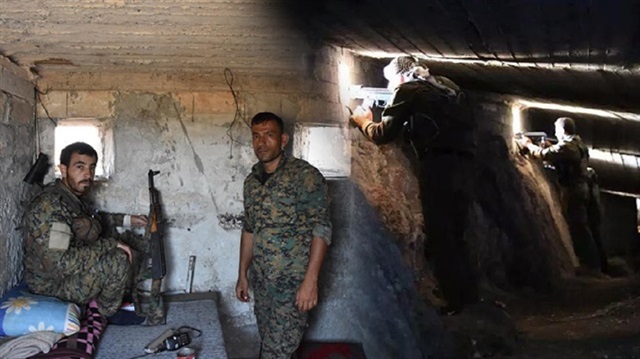
A four-point plan was put in place by the PKK’s so-called Afrin military responsible, Mahmud Berhadan, who was dispatched from Qandil, which divides PKK-occupied Afrin into four military regions
Kurdistan Workers’ Party (PKK)’s Syria offshoot, the PYD, has mobilized its forces in Syria’s Afrin, in anticipation of a possible operation by the Turkish Armed Forces (TAF), digging a 20-kilometer tunnel network along the border with Turkey, where terrorists receive training and store weapons.
A four-point plan was put in place by the PKK’s so-called Afrin military responsible, Mahmud Berhadan, who was dispatched from Qandil, which divides PKK-occupied Afrin into four military regions: “Jandarees- Sheikh Hadid,” “Mabadli- Rajo,” “Sharan- Bulbul” and “city center,” establishing four resistance lines that stretch from the border to counter any possible operation by the Turkish Armed Forces (TAF).
Berhadan’s first line of “resistance” is made up of PKK-allied Arab elements including Jaysh al-Ashayer, Jaysh al-Shamal and Jaysh al-Thuwwar.
The terror commander’s second line of defense is a unit comprised of a mix of “experienced” terrorists and those who were forced to take up arms.
The third line of resistance is made up of a group called “civil communes,” while the final one is positioned in the city center and is comprised of police units.

Railway tunnels in Rajo, located five kilometers from the border with Turkey, were turned to depots to store the weapons and munitions sent by the U.S. to PKK terrorists. In the past three months, over 700 terrorists were made to dig underground tunnels along the border, some of which are said to be able to camouflage tanks and armored vehicles.

Using the İslahiye- Aleppo railway tunnels, PKK terrorists were able to dig a network of additional underground tunnels that stretch 20 kilometers.
PKK tunnels, which are 4-meters deep in some locations and include special conference rooms, serve as grouping and deployment points, and were filled with mines that will be detonated in the event that the first line of defense collapses during a Turkish Army operation.

Tunnels dug along the border in part overlook Turkey and TAF position in Idlib at entry points located at close distances. These entryways, which are manned by around the clock by terrorists, serve as clandestine observational posts for PKK/PYD terrorists, where snipers and mortar artillery have been positioned.
PKK/PYD terrorists have set up a broadcast station in Mount Burj al-Abdullah in western Afrin, which covers the entire region, while the mount’s old caves that overlook the city’s northern regions serve as munitions depots for PKK terrorists.

The PKK, which occupies northern Syria regions with backing from the U.S. under the pretext of Daesh, is currently adopting a wait-and-see approach in anticipation of any possible operation by Turkey.
U.S. anti-Daesh envoy Brett Mcgurk has met with senior terror commanders in Syria’s Hasakah and instructed them to target Turkish President Recep Tayyip Erdoğan by spreading false propaganda that targets the Turkish leader and his ruling Justice and Development AK party in both Syria and Iraq.
The PKK is listed as a terrorist organization by Turkey, the European Union and the United States. The PKK has been conducting armed violence in the southeastern part of Turkey since 1984. More than 40,000 people, mostly civilians, have been killed in the three-decade long conflict.






